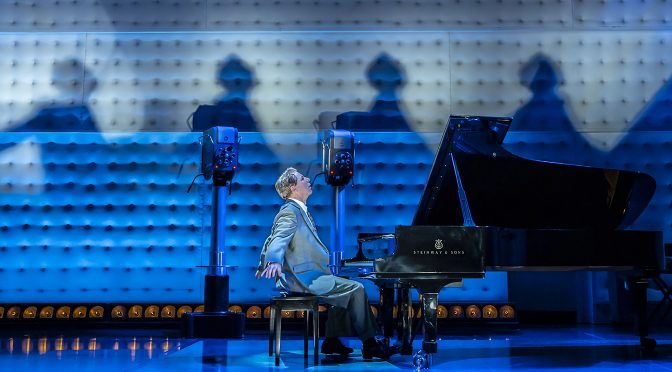There’s a danger of damning Doug Wright’s Broadway hit with faint praise. The writing is sound, the direction from Lisa Peterson solid. There are plenty of interesting themes surrounding the story of a virtuoso pianist suffering from poor mental health that make the show an excellent vehicle for its star, Sean Hayes, who is aided by a strong supporting cast. It looks good, too, with the 1950s setting made stylish in Rachel Hauck’s set and Emilio Sosa’s costumes. There’s next to nothing to complain about.
Oscar Levant, billed as one of the 20th century’s greatest wits, followed his successful musical career as a TV personality who was infamous for his openness about his health. The play pairs him with Jack Paar, said to have invented late-night television with Tonight, and imagines one episode with Levant sneaking out of a mental hospital to appear on the show. It’s a good story that Wright gets a lot out of, and Peterson paces the script superbly.
The blend of comedy and tragedy is handled well. Levant is funny, but his condition is a concern. Blessed (or should that be cursed?) with prodigious self-awareness, he needs to perform. Fascinated TV executives and viewers both condemn and exploit him.
The role’s attraction for Hayes is clear, and he is, indeed, a revelation. That’s not so hard, since most Londoners will only know him as Jack from early Noughties sitcom Will & Grace. But he gets a standing ovation presenting a very different and complex man. Strong support from Rosalie Craig as his wife helps, despite her role, like too many others, being underwritten. Craig is excellent at showing a cool compassion that carries the action. Yet Hayes can’t help but steal the show. Yes, he is good with the comedy, but he is moving as well, managing to make us feel for Levant without patronising him. The piano playing is especially impressive and a great theatrical moment. Not only does Hayes give a great rendition of Rhapsody in Blue, but he acts while he is doing it.
Given Levant’s tortured relationship with Gershwin, who appears as an hallucination (performed by David Burnett), the influence of Peter Schaffer’s masterpiece is clear. But this is Amadeus with addiction issues, an addition that is interesting and convincing.
Another side of the story, Levant’s involvement with TV, might present more of a struggle for a home crowd. The late-night chat show isn’t as much of an institution here. While Ben Rappaport gives a layered performance as Paar, the excellent Richard Katz doesn’t have enough to do as a TV executive and Eric Sirakian’s role as a show runner is a weak comic foil. But even here, Peterson manages to convey the bustle of live TV, while questions around the nature of celebrity are clear and thought-provoking. If the play isn’t particularly adventurous, it is admirably thorough and conscientious. There really is a lot to praise.
Until 21 September 2025
Photos by Johan Persson

